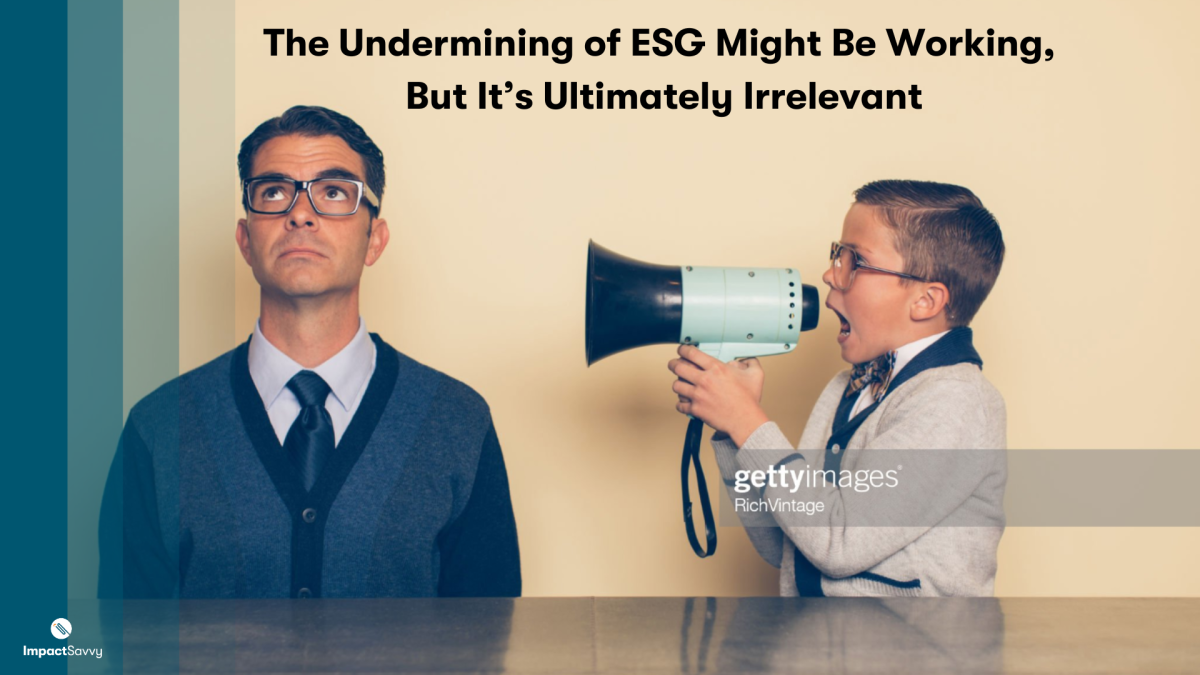By Kari Hayden Pendoley, Founder of Impact Savvy.
Picture the joke: “an environmental engineer, a grassroots organizer, and a compliance lawyer walk into a bar…” The punchline? “My ESG team!” The creation of the Environmental, Social, Governance (ESG) function - bringing together dozens of subfunctions - was always an odd premise. In the US, ESG functions are often made up of sustainability and Environmental Health and Safety (EHS), philanthropy and Corporate Social Responsibility (CSR), social justice and Diversity Equity & Inclusion (DEI) and several other teams with very different skills and backgrounds. Using business-speak and the power of a good acronym, akin to “IPO” or “ROI,” ESG demanded its work be taken seriously. Beyond “going green” and “doing good,” ESG invited business integration, financial scrutiny, and accountability metrics, with the hope of proving it belonged on executives' agendas alongside revenue generating activities.
And to a certain degree, it was working. Despite the complexity of some 600 ESG rankings published globally, 140 ESG data providers, and dozens of reporting frameworks - 90 percent of S&P 500 companies and 70 percent of Russell 1000 companies now publish ESG reports in some form.
But when $10 million in anti-ESG research and public relations rhetoric hit the U.S. media in 2022, it lit a match to the existing confusion around cross-functional effectiveness, consistency of outcomes, and transparency of progress. Depending on who you ask, the purpose of ESG means different things:
- Investors gather financial and non-financial information to make good investment decisions. Fifty-four percent of KPMG’s M&A investors cancel deals when presented with ESG red-flags (or lack thereof).
- Consumers are actively asking for businesses to play a bigger role in environmental and social issues. Sixty-nine percent of the American public favor the U.S. taking steps to become carbon neutral by 2050. And 54% of consumers stopped purchasing from a company due to its public position on an issue.
Businesses are responding to consumer demand with 50% of CEOs tying their pay to ESG Goals to drive accountability.
- Government legislation has catapulted funding and provided tax incentives (most recently reflected in the $500 billion Inflation Reduction Act) to increase providers and producers of green energy and other related sectors.
Then came the negative headwinds in the U.S. calling ESG “broken,” “wokewashing,” “greenwashing,” “anti-business,” and more. Now each stakeholder group is reflecting on their role and what ESG means for them.
- Investors like Blackrock CEO Larry Fink, an early vocal advocate for ESG, will stop using the term and S&P announced it would cease ESG Grading.
- Consumers are caught in the culture wars around both ESG and DEI are seeing whiplash for brands around values and advocacy: McDonalds pulls ESG from its website, Mastercard facing shareholder pressure on the possible tracking of gun-related transactions, BudLight boycott over LGBTQAI+ advertising, and Chick-fil-A can’t please either side with progressive boycotting over anti-LGBTQAI+ statements and more recently conservatives boycotting the company for having a DEI department.
- Businesses like Shell and Walmart are accused of greenwashing. Twenty-seven percent of companies are reducing their level of external communication about ESG and citing terms like sustainability and social impact instead.
- Government on the state level has roughly half of all anti-ESG bills gaining traction, while federal regulation from the Securities Exchange Commission (SEC) on greenhouse gas emissions (GHG) is still on hold. The armwrestling continues with lawyers sending subpoenas to fund managers over ESG disclosures and investors giving support for a ruling.
This is just a small fraction of what is happening in this space but rather than get caught up in the spin, we as practitioners need to elevate the conversation and concentrate on what is constant.
- ESG puts an important spotlight on non-traditional risk and revenue opportunities. ESG unifies the non-financial metrics of: environmental waste, human capital, employee satisfaction, supply chain diversification, board oversight and ethics, and dozens of others small teams. By quantifying unseen risks (cost savings) and uncovering revenue opportunities (new market growth), what once was just small wins/gains alone together accounts for material financial impact to the business.
- ESG contributes to financial gain. A company that increases its ESG score by 10 points experiences an increase of approximately 1.8x in its EV/EBITDA multiple. And long term the impact remains stable, with 90% of studies showing ESG having a neutral or positive impact on Corporate Financial Performance (CFP).
- ESG is accelerating globally. Global ESG regulation has increased by 155%, with new mandatory standards in the EU and APAC.
- ESG shouldn’t be the focus. First rule of ESG: don’t talk about ESG. ESG reports that overuse the phrase immediately signal marketing speak over material substance. ESG scoring and ranking is still made up of the sum of its parts. Sophisticated algorithms are looking for hundreds of keywords to signal broad reach and specific program references, like human capital, materiality assessment, pay equity studies, board diversity disclosures, and more.
- ESG teams should be temporary. A successful ESG team is one that has integrated its activities into the right business functions so they become a part of the company’s long-term success. We should all aspire to be like Malu Pinto e Paiva, EVP of sustainability at Vale. Paiva envisions her role as temporary; her goal is to embed sustainability throughout the organization: "My role should be biodegradable.”
While ESG as a term may not survive the scrutiny over time, as practitioners we must stay engaged with skeptics and address their concerns. The work is here to stay as long as we focus on clarity of purpose: we create value for the company.
About the Author:
Kari Hayden Pendoley is the Founder of Impact Savvy a strategy firm bringing profit and purpose together for its ESG and DEIB clients. Kari has worked with Fortune 5 companies, Nobel Laureates, Forbes Top 10 Self-Made Women, celebrated social entrepreneurs, and government agencies. Kari is a National Diversity Council certified practitioner, a Board member, and a thought leader writing for industry blogs and speaking at events.





